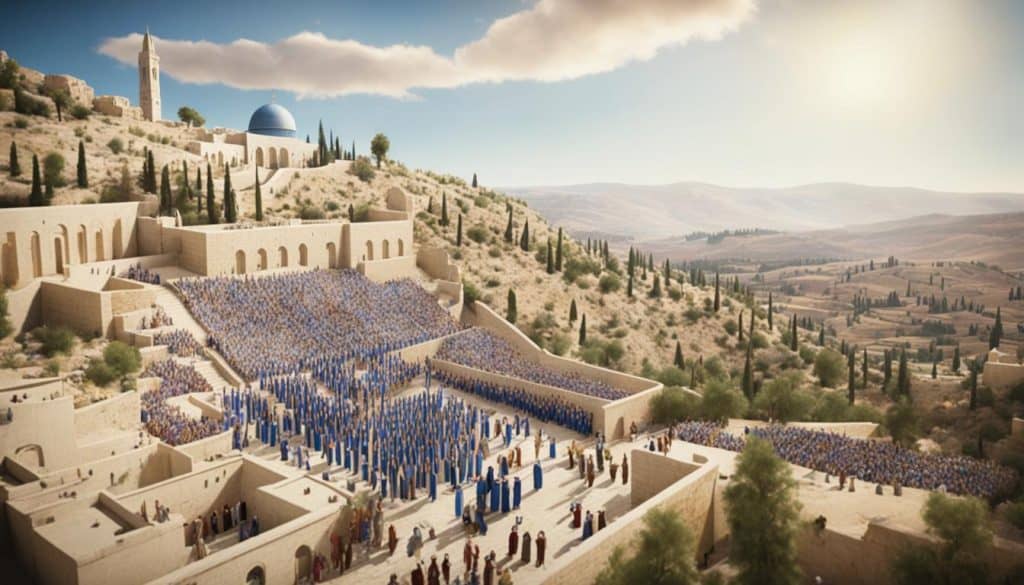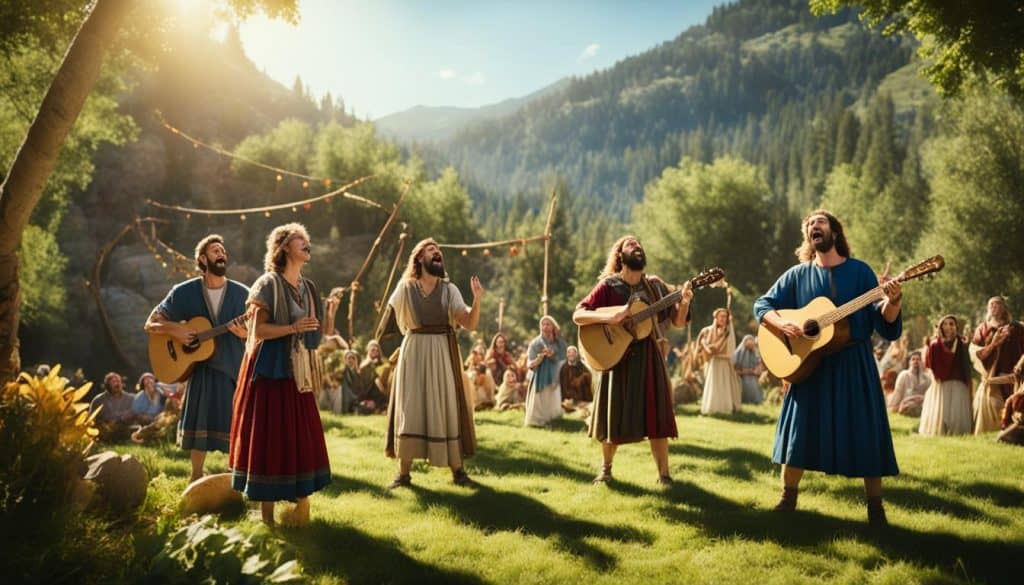Ever thought about who brought music to the Bible? Music was a big part of their spiritual and social life. It was key in worship and celebrations. By looking into the lives of biblical musicians, we see how music became a strong way to express feelings in ancient times.
Figures like Jubal played a big role in shaping music traditions. They show us how vital music was in biblical society.
Music in the Bible wasn’t just for worship. It also helped people connect with each other. Let’s dive into the history of music in the Bible. We’ll see how it has shaped our world, even today.
Understanding the Origins of Music in the Bible
When we look at the earliest mention of music in the Bible, Jubal stands out as the first musician. He is mentioned in Genesis. This shows how music was used early on as a way to express feelings and connect with the divine. The origins of music in worship go way back to these times. Music was more than just an art form; it was a way to connect spiritually.
In the Bible, biblical references to music show its many roles. Music was there for both happy celebrations and serious worship. It was a big part of community life and religious activities. Over time, this led to the creation of traditions that we still see today. The Bible teaches us that music makes worship better and brings people together, laying the groundwork for future generations.
Looking deeper into the Bible, we find many examples of how music’s role changed over time. These biblical references to music show a long history of sound that has lasted for centuries. They tell us that music is essential to our spiritual journey, not just a side thing.
| Aspect | Details |
|---|---|
| Earliest Mention | Jubal as the first musician in Genesis |
| Music’s Role | Expression of faith and community connection |
| Worship Integration | Enhances spiritual communion and collective worship |
| Evolution | Develops into established traditions over time |
Who Was Jubal: The Father of Musicians?
Jubal appears in Genesis 4, playing a big role in biblical music history. He is known as the father of musicians, bringing organized music to the world. His work shows how music was key in biblical times.
Jubal’s Significance in Genesis
In Genesis 4, Jubal stands out. He is called “the father of all who play the harp and flute.” This shows he helped shape early music, laying the groundwork for future musicians. His role highlights music’s deep cultural value, showing its importance in early societies.
How Jubal Influenced Musical Tradition
Jubal’s impact on music is huge, setting a standard for artistic expression. Music has become crucial for communication and celebration in many cultures. His work shifted music from a hobby to a respected art form. The traditions he started still live on, proving music’s lasting impact.

| Aspect | Jubal’s Influence | Impact on Music |
|---|---|---|
| Visibility | First mentioned musician in the Bible | Legitimizes musical expression |
| Instruments | Associated with harp and flute | Sets a precedent for instrument diversity |
| Cultural Role | Father of musicians | Broadens the purpose of music in society |
The Role of Music in Biblical Times
In biblical times, music was a key part of life. It was not just for fun but also for showing devotion and celebrating. The Bible talks about many musical instruments, showing the variety of sounds at different events.
Music as an Established Art Form
Music was a vital art form in those days. It was deeply woven into worship and everyday life. It was more than just songs; it was a way to pray, celebrate, and share identity.
Different Genres of Music in Ancient Israel
Looking into ancient Israelite music shows a lot of variety. Each type of music had its own purpose, like sacred hymns in the temple or lively tunes at festivals. Some main types were:
- Devotional songs for worship.
- Sorrowful dirges for mourning.
- Joyful anthems for celebrations.
This variety shows how important music was as an art form. It also shows its role in bringing people together. These melodies were key in personal and group experiences.
| Genre | Purpose | Instrument Examples |
|---|---|---|
| Devotional | Worship and prayer | Harp, lyre |
| Sorrowful | Mourning rituals | Flute, voices |
| Joyful | Celebrations and feasts | Trumpet, tambourine |
King David: Musician and Psalmist
King David was a key figure in biblical music. His work greatly influenced how faith and music are linked. He used music to express deep feelings, bring people together, and show devotion.
David’s Role in Worship and Music
As both a King and a musician, David showed the power of worship through song. His talent on the lyre brought comfort to many. For example, his music helped King Saul feel better when he was troubled (1 Samuel 16:23).
This shows how music can be a spiritual support in tough times. David’s music wasn’t just for himself; it brought the Israelites closer to God together.
The Impact of David’s Psalms on Worship
David wrote many Psalms that have deeply influenced worship. These Psalms cover themes like praise, sadness, and thanksgiving. They are key in Jewish and Christian worship services.
Each Psalm is more than just a poem; it inspires people in their faith. Today, people all over the world use these Psalms to express their beliefs. David’s writings help people connect with God on a personal and group level.
Levitical Musicians: Guardians of Sacred Music
The Levitical musicians played a big role in ancient Israel’s religious life. They were chosen to lead the music in the Temple. This shows how important music was in worship. They helped create a spiritual and devoted atmosphere through their music.
The Functions of Levitical Musicians
Levitical musicians had many duties during worship and rituals. They were responsible for:
- Leading the community in worship.
- Playing music at important events like sacrifices and celebrations.
- Teaching music to keep traditions alive.
- Creating music that supported spiritual activities.
Musical Arrangements in the Temple
The music in the Temple was carefully planned. Chronicles show that King David played a big part in this. He chose musicians and organized them into groups. This included:
| Aspect | Description |
|---|---|
| Types of Instruments | Stringed instruments, flutes, and percussion were commonly used. |
| Performance Settings | Musicians played in front of the altar, during processions, and at special events. |
| Rehearsal Practices | Regular practice sessions helped musicians get ready for their roles. |
| Role of Leadership | Some musicians led the performances and planned the schedules. |

The Prophetic Use of Music in the Bible
Music is a key part of prophecy in the Bible. It helps create a space for deep spiritual connection. Prophets often used music to connect with the divine when sharing messages.
Music and Prophecy: A Spiritual Connection
Music and prophecy are closely linked. Music helps to share divine insights and lifts spiritual awareness. By using melodies, prophets could focus their thoughts and emotions. This deepens their connection with God’s messages.
This shows how music and spirituality are deeply connected. Music is a powerful way to experience faith.
Case Study: Elisha and the Harpist
Elisha and the harpist’s story is a great example. In 2 Kings 3:15, Elisha wanted a message from God. So, he asked a harpist to play.
The music did more than just fill the air. It turned the space into a sacred place for prophecy. This story shows how music connects us to the divine, making our interactions with God more meaningful.

| Prophet | Musical Element | Purpose |
|---|---|---|
| Elisha | Harp | Facilitating prophecy |
| David | Lyre | Worship and praise |
| Samuel | Various instruments | Spiritual gatherings |
Exploring the Songs of Ascent
The Songs of Ascent, found in Psalms 120 to 134, are very special in biblical music. They were important for pilgrims going to Jerusalem for religious festivals. These hymns were more than just music; they brought people together and deepened their spiritual connection.
The Meaning Behind the Songs of Ascent
The Songs of Ascent mean more than just words. They talk about hope, thanks, and looking back. They show a pilgrim’s desire to connect with the divine during their long journey. These songs helped people feel united, sharing feelings of reverence and purpose.
Musical Legacy of Pilgrimage to Jerusalem
This music is not just about going to Jerusalem. It’s about spiritual journeys too. The melodies and rhythms of the Songs of Ascent have lasted through time. They have influenced today’s worship and music. Singers and groups still perform these songs, keeping this tradition alive.

| Song | Theme | Key Verse |
|---|---|---|
| Psalms 120 | Deliverance from Deceit | “Save me, O Lord, from lying lips.” |
| Psalms 121 | God’s Protection | “I lift up my eyes to the hills.” |
| Psalms 124 | Help in Trouble | “If it had not been the Lord who was on our side.” |
| Psalms 134 | Blessing in the Temple | “Come, bless the Lord, all you servants of the Lord.” |
Music in Celebrations and Mourning
Music was a key way to express feelings in both happy and sad times in the Bible. At weddings and coronations, music made these big events even more joyful. When people were grieving, music helped them find comfort and a way to share their sadness together.
Celebratory Music in Weddings and Coronations
Weddings were filled with happy tunes. These songs and instruments made everyone feel joyful and connected. At coronations, grand music welcomed the new leader with fanfares. Music brought people together, making these important moments unforgettable.
The Role of Professional Mourners
The Bible shows how important professional mourners were. These skilled people expressed grief in a formal way, helping communities show their sadness at funerals. Jeremiah’s words highlight their role in helping everyone feel and share their sorrow. Music in mourning was crucial for coping with loss.
New Testament References to Music
Music is a key part of the New Testament. It shows its importance in Jesus’ life and in early Christian communities. You’ll see how music helped shape faith, worship, and community bonds.
Music in the Life of Jesus
Jesus and music had a deep connection. He often participated in cultural and spiritual practices of his time. For example, he sang hymns with his disciples after the Last Supper (Matthew 26:30).
This shows how music was a way to worship and unite people. It added a special touch to Jesus’ teachings and actions.
The Role of Music in Early Christian Communities
In early Christian communities, music and faith were closely linked. Believers used song to express their faith. The Apostle Paul even told the faithful to use psalms, hymns, and spiritual songs (Ephesians 5:19).
This focus on music helped create a strong spiritual bond among members. It made them feel like they belonged together. As these communities grew, their musical traditions changed. They showed the many ways faith could be expressed through music.
| Aspect | Details |
|---|---|
| Jesus and Music | Sang hymns with disciples, illustrating worship through song |
| Community Engagement | Music fostered connections and a sense of belonging |
| Church Practice | Usage of psalms, hymns, and spiritual songs encouraged by Paul |
| Evolution of Music | Musical practices reflected diverse expressions of faith |
How Did Music Play a Role in Differentiating the Righteous from the Wicked in Biblical Times?
In biblical times, music often reflected the moral divide between good and evil. The faithful used songs and hymns to glorify God, setting them apart from those who worshiped false idols. Music became a guide, leading individuals along the paths of the righteous and away from the influence of the wicked.
Symbolic Representations of Music in Revelation
The Book of Revelation shows music as a key part of heavenly worship in the Bible. It’s not just music; it’s a deep way to express joy and victory over evil. You’ll see trumpets and harps that hint at big events, linking to music’s long history in the Bible.
Music in Revelation is more than sounds; it’s spiritually deep. It calls people to worship and shows strong faith. This link between earthly and heavenly music makes you think about music’s true meaning in Revelation. It shows our deep desire to connect with the divine, making us think about our spiritual paths.
Looking at these symbols, think about how they reflect our search for a deeper connection with God. The music in Revelation celebrates God’s wins and shows music’s lasting role in our spiritual lives and community.
